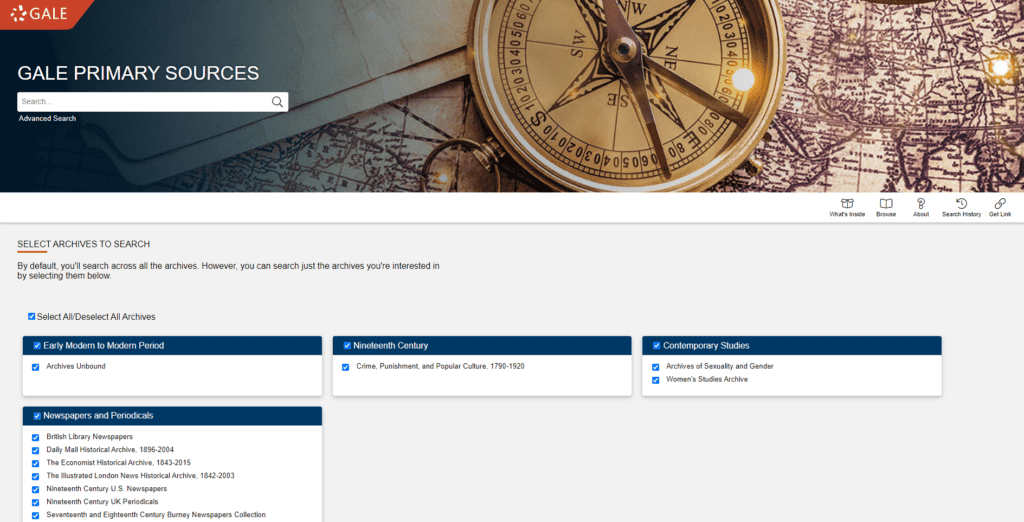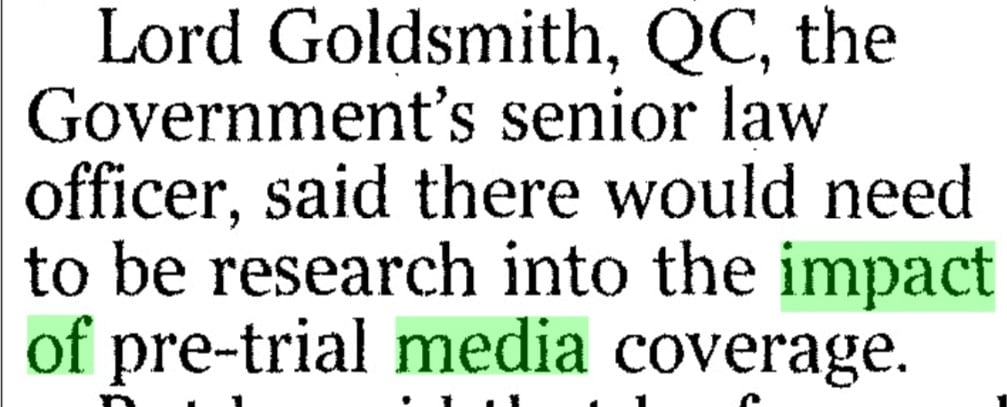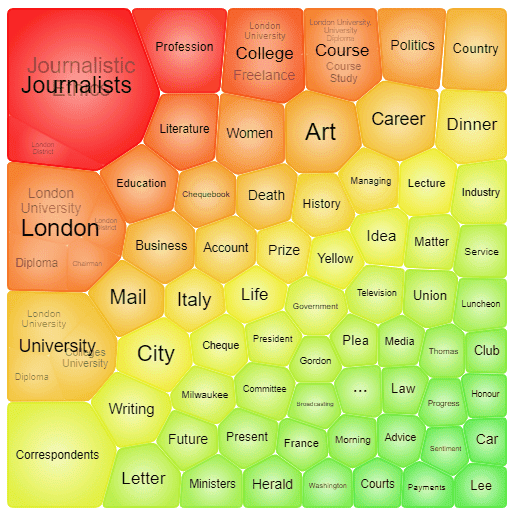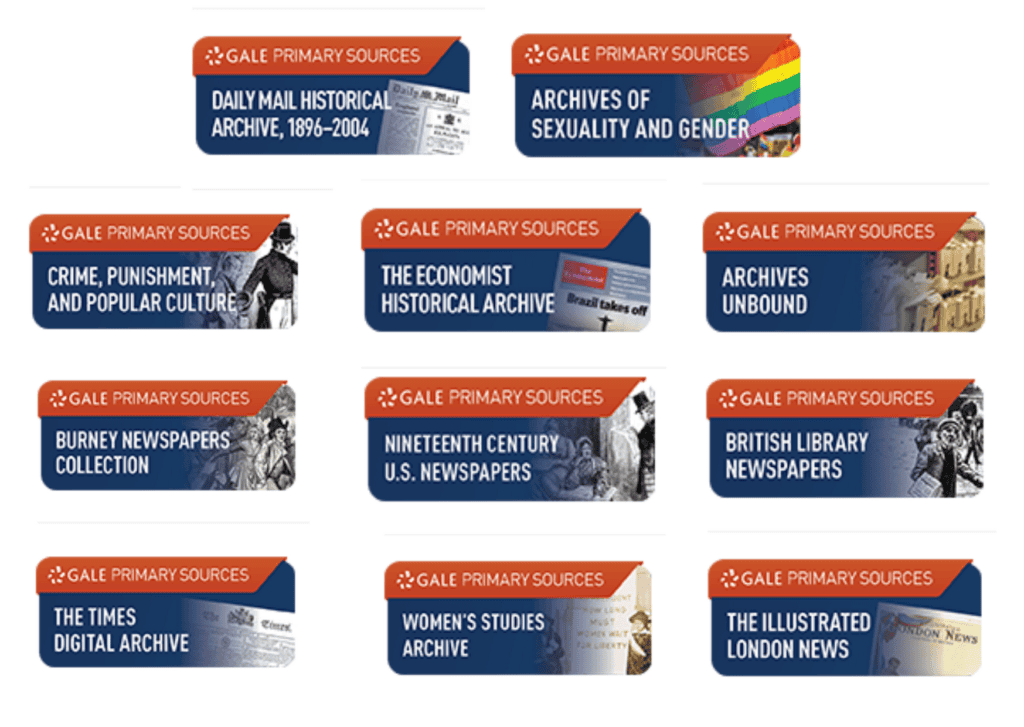│By Emily Priest, Gale Ambassador at the University of Portsmouth│
In this post, Emily interviews an undergraduate student before and after running a one-to-one training workshop on Gale Primary Sources, revealing how the platform tools and extensive content can help alleviate some of the difficulties the student faced in their studies.
A Media Student in Need
Tell us a little bit about you and your course at Portsmouth so far?
My name is Jack (name edited as per request of student), and I am in my third year at Portsmouth Uni, studying Journalism and Media. I took a year out but am now back to finish my course and maybe go onto a Masters. I am not sure but I really enjoy the course so far, it gives me new ways of looking at the world and I enjoy finding out new things.
How do you normally approach research?
I normally focus on current topics in my course, so I use news articles online which I normally get from Google. Sometimes I will use Google Scholar to find some more technical, theory stuff or go onto the library’s “Discover” section on their website. Honestly, I struggle with researching as I find it really boring, so I don’t spend much time on it and use what’s available.
What tools do you use for research and why?
OneNote and Google Drive would be the biggest ones. They help me organise myself and put all my findings in one place so I can just get on with writing and not worrying about finding this or that. I used to have post-it notes and books all over my room, but it got a little crazy! I try to keep it all digital now. It’s easier that way and I can use it on the go when I’m on the train travelling back home from Portsmouth.

What do you struggle with most?
Motivation and definitely organisation. I love finding out things and debating with people but struggle with planning and getting the urge to write. I think because I find it so difficult to phrase what I am saying, or to organise my argument, I put my work off altogether. I really, really hate citations too. I am in my third year and still don’t know how to do them right. I spend most of my time sorting them out rather than writing the essay, but to be honest sometimes I give up. It takes up too much time writing them all out or finding the info you need like dates or publication info.
What do you know about Gale so far and what are your experiences with it?
I don’t know much about Gale. I have heard of it or them before and seen them at Freshers and in the library, but I have always been too shy to go up to them to ask more. I heard more about them in my second year when I met you [a Portsmouth Student Gale Ambassador] but then I took a year off. Now I am in my third year I want to give it a proper go for my dissertation, but I don’t really know where to start or if it will be useful. I know some of my friends in the History department use it but I am not sure how that is supposed to help me, a Media student.
What are you hoping to find and learn from this workshop?
I want to try new things to help my grades because what I am doing right now is not working. I hope it can help with my organisation at least because maybe then I will be more motivated. I think the biggest thing though is to see how Gale can relate to my course. Like I said, I use a lot of current news articles in my essays and I only know Gale to have historic sources. I think finding out how to link the two would be really helpful.

A Gale Primary Sources Workshop
I then sat down with Jack and showed him first-hand the Gale Primary Source databases available at Portsmouth and how to use the platforms to help guide and supplement research. First we went to www.tinyurl.com/PortsmouthGale, logged in using his student number and password and were quickly directed to the Portsmouth Gale landing page (above). I showed him all the features at hand including the sophisticated advanced search features, examples of data visualisation in the Topic Finder and Term Frequency tools, the painless citation tools and all the varied sources available from periodicals to illustrated news, photographs and essays. Afterwards, we sat down to discuss his take on the workshop and how he found his time delving into the depths of Gale’s resources.

“Everything I needed to help me was there!”
What were your initial opinions?
It was brilliant and to be honest I feel like a bit of an idiot. I didn’t realise how much there was and that it wasn’t just old or historic sources. I was worried there would just be loads of long essays too but the sources were really varied. There were some short news articles we saw in The Times that would have been really useful in my first and second year. The layout is really nice too. It’s easy on the eyes and it is so easy to find what I want. Everything I needed to help me was there, that was the biggest thing I noticed.
What features did you like best and why?
The citation tool for sure! I can get a citation for every source I want on Gale in one click and I can import them into different programs too which is perfect. The Topic Finder and term clusters were really cool too. Being able to see my search results in a visual way like that really, really helps. I struggle to picture things sometimes which makes it harder to be organised or to summarise what I am trying to say… But seeing it like that, as an interactive, colourful image – I don’t know, things just clicked. I really enjoyed the search function too and how you could search and highlight sources like magazines. That’s one thing I really hate – going into the library and having to read hundreds of magazines for just one thing, it’s such a waste of time, but in Gale I could do that in like, I don’t know, a few minutes! It’s a lifesaver.

Gibb, Frances. “Pre-trial reporting laws could change.” Times, 25 May 2007, p. 2. The Times Digital Archive, https://link.gale.com/apps/doc/IF0503529586/GDCS?u=uniportsmouth&sid=GDCS&xid=5b5e7f71
What could be improved?
I think although there is a lot on Gale, I want to see more topics covered. Although I know our library doesn’t have all their databases so I think they should get more because I would really like to see what else there is. Other than that… I don’t know, I really like Gale, I don’t know if there is much else you could add. Maybe some more visualisation like the term cluster would be brilliant. I’m a visual learner and just those little touches made researching a lot easier. I think more of that kind of thing would help and motivate me a lot more!

“I was worried about my dissertation but not so much now.”
Will Gale help you in your future research and why?
I will definitely use it for my dissertation, and I am sure if I do go on to a Masters I will use it then too. I was wrong to think that the sources wouldn’t help me, that they would all be historic and irrelevant to my essay topics. There were so many articles in there that would have helped me write my old essays, especially the newspaper databases. The Times and even the Daily Mail archives would massively help my work and I think using some of the older stuff would be good too so I can use it as a comparison to back up my argument. Even if the issues I am writing about are new, they still come up in these older sources so I think it would be really helpful to go into that more and see if I can find any patterns. It’s going to massively boost my organisation too and really help with cutting down the time I spend on writing citations. I feel like it’s going to help me focus and make my time feel more worthwhile. I’m a bit excited actually. I was worried about my dissertation but not so much now.
Would you recommend Gale and why?
Yes definitely. I should have used Gale ages ago. The citation tools and visualisations are the biggest sellers in my opinion because not many other places have those features, along with everything else, and they really helped me personally. It is really helpful even if you can’t find the exact sources you need, and it helps to give you inspiration or motivation. I wish I used Gale in my first and second year, so yeah I would recommend it. It’s brilliant.
Jack was very pleased with his time using Gale Primary Sources and was surprised to find that such an extensive database with so many useful sources was hiding right under his nose.

Want to try Gale Primary Sources yourself?
If you are also a student at the University of Portsmouth and want to explore Gale yourself, use this link and log in with your student details. If you are a student at another university, try typing “Gale Primary Sources” into your library catalogue or contact a librarian.
Good luck!
Want to read more about how Gale Primary Sources can help students in their studies? Check out How Gale Primary Sources Helped Me with My Dissertation – and Can Help You Too! (by Lily, English Lit student at the University of Birmingham) and Why Use Primary Sources? (by Pauli, Political History student at the University of Helsinki).

